Frequent persons on Cyprus's street signs
countries
41 names / 197 streets
Makarios III
 24
Makarios III was a Greek Cypriot archbishop, primate, statesman and politician, who served as the first President of Cyprus between 1960 and 1977. He was also the Archbishop of the autocephalous...
24
Makarios III was a Greek Cypriot archbishop, primate, statesman and politician, who served as the first President of Cyprus between 1960 and 1977. He was also the Archbishop of the autocephalous...
Georgios Grivas
 13
Georgios Grivas, also known by his nickname Digenis, was the Cypriot founder and leader of the Greek and Greek Cypriot paramilitary organisations Organization X (1942–1949), EOKA (1955–1959) and EOKA...
13
Georgios Grivas, also known by his nickname Digenis, was the Cypriot founder and leader of the Greek and Greek Cypriot paramilitary organisations Organization X (1942–1949), EOKA (1955–1959) and EOKA...
Andrew the Apostle
 12
Andrew the Apostle, also called Saint Andrew, was an apostle of Jesus. According to the New Testament, he was a fisherman and one of the Twelve Apostles chosen by Jesus. The title First-Called stems...
12
Andrew the Apostle, also called Saint Andrew, was an apostle of Jesus. According to the New Testament, he was a fisherman and one of the Twelve Apostles chosen by Jesus. The title First-Called stems...
Yiannakis Omirou
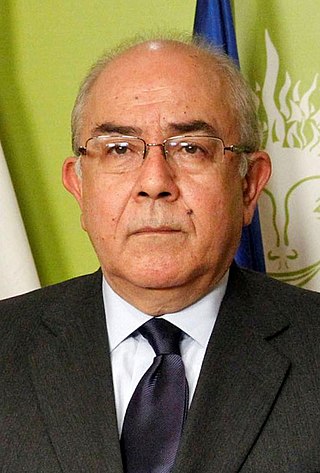 11
Yiannakis Omirou is a Greek-Cypriot politician. He was president of the Cypriot parliament from 2011 to 2016 and was leader of political party EDEK between 2001 and 2015.
11
Yiannakis Omirou is a Greek-Cypriot politician. He was president of the Cypriot parliament from 2011 to 2016 and was leader of political party EDEK between 2001 and 2015.
Grigoris Afxentiou
 10
Grigoris Pieris Afxentiou was a Greek-Cypriot insurgent leader who led campaigns against the British colonial government as a member of EOKA. He was second-in-command to general Georgios Grivas and...
10
Grigoris Pieris Afxentiou was a Greek-Cypriot insurgent leader who led campaigns against the British colonial government as a member of EOKA. He was second-in-command to general Georgios Grivas and...
Spyros Kyprianou
 9
Spyros Achilleos Kyprianou was a Cypriot barrister and politician, who served as President of Cyprus from 1977 to 1988. He also served as President of the Cypriot House of Representatives from 1976...
9
Spyros Achilleos Kyprianou was a Cypriot barrister and politician, who served as President of Cyprus from 1977 to 1988. He also served as President of the Cypriot House of Representatives from 1976...
Evagoras Pallikarides
 8
Evagoras Pallikarides was a Greek-Cypriot poet and revolutionary who was a member of EOKA during the 1955–1959 campaign against British rule in Cyprus. He was arrested on 18 December 1956 when he was...
8
Evagoras Pallikarides was a Greek-Cypriot poet and revolutionary who was a member of EOKA during the 1955–1959 campaign against British rule in Cyprus. He was arrested on 18 December 1956 when he was...
Saint George
 8
Saint George, also George of Lydda, was an early Christian martyr who is venerated as a saint in Christianity. According to tradition, he was a soldier in the Roman army. Of Cappadocian Greek origin,...
8
Saint George, also George of Lydda, was an early Christian martyr who is venerated as a saint in Christianity. According to tradition, he was a soldier in the Roman army. Of Cappadocian Greek origin,...
Alexander the Great
 6
Alexander III of Macedon, most commonly known as Alexander the Great, was a king of the ancient Greek kingdom of Macedon. He succeeded his father Philip II to the throne in 336 BC at the age of 20...
6
Alexander III of Macedon, most commonly known as Alexander the Great, was a king of the ancient Greek kingdom of Macedon. He succeeded his father Philip II to the throne in 336 BC at the age of 20...
Giannos Kranidiotis
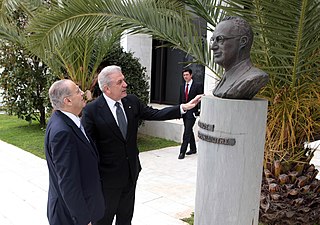 6
Giannos Kranidiotis was a Greek diplomat and politician.
6
Giannos Kranidiotis was a Greek diplomat and politician.
Homer
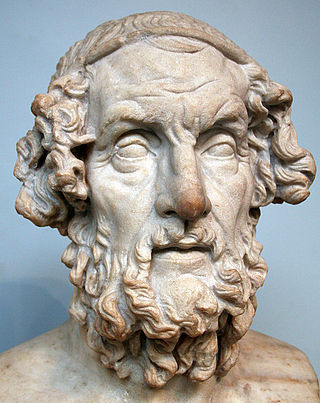 6
Homer was a Greek poet who is credited as the author of the Iliad and the Odyssey, two epic poems that are foundational works of ancient Greek literature. Homer is considered one of the most revered...
6
Homer was a Greek poet who is credited as the author of the Iliad and the Odyssey, two epic poems that are foundational works of ancient Greek literature. Homer is considered one of the most revered...
Eleftherios Venizelos
 6
Eleftherios Kyriakou Venizelos was a Cretan Greek statesman and prominent leader of the Greek national liberation movement. He is noted for his contribution to the expansion of Greece and promotion...
6
Eleftherios Kyriakou Venizelos was a Cretan Greek statesman and prominent leader of the Greek national liberation movement. He is noted for his contribution to the expansion of Greece and promotion...
Poseidon
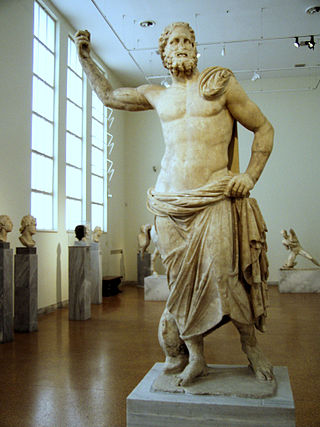 4
Poseidon is one of the Twelve Olympians in ancient Greek religion and mythology, presiding over the sea, storms, earthquakes and horses. He was the protector of seafarers and the guardian of many...
4
Poseidon is one of the Twelve Olympians in ancient Greek religion and mythology, presiding over the sea, storms, earthquakes and horses. He was the protector of seafarers and the guardian of many...
Archimedes
 4
Archimedes of Syracuse was an Ancient Greek mathematician, physicist, engineer, astronomer, and inventor from the ancient city of Syracuse in Sicily. Although few details of his life are known, he is...
4
Archimedes of Syracuse was an Ancient Greek mathematician, physicist, engineer, astronomer, and inventor from the ancient city of Syracuse in Sicily. Although few details of his life are known, he is...
Franklin D. Roosevelt
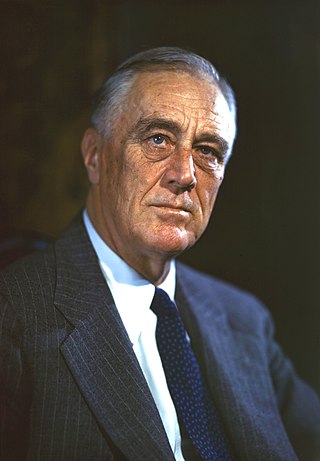 4
Franklin Delano Roosevelt, commonly known by his initials FDR, was an American statesman and politician who served as the 32nd president of the United States from 1933 until his death in 1945. He was...
4
Franklin Delano Roosevelt, commonly known by his initials FDR, was an American statesman and politician who served as the 32nd president of the United States from 1933 until his death in 1945. He was...
Kyprianos of Cyprus
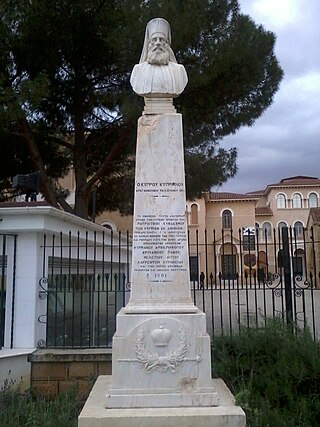 4
Archbishop Kyprianos of Cyprus was the head of the Cypriot Orthodox Church in the early 19th century at the time that the Greek War of Independence broke out.
4
Archbishop Kyprianos of Cyprus was the head of the Cypriot Orthodox Church in the early 19th century at the time that the Greek War of Independence broke out.
Markos Drakos (EOKA fighter)
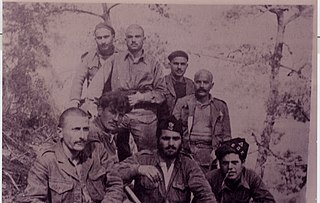 4
Markos Drakos was a Greek Cypriot guerrilla fighter who was killed in the EOKA struggle (1955–1959) against the British. His nom de guerre was Lykourgos.
4
Markos Drakos was a Greek Cypriot guerrilla fighter who was killed in the EOKA struggle (1955–1959) against the British. His nom de guerre was Lykourgos.
Saint Nicholas
 4
Saint Nicholas of Myra, also known as Nicholas of Bari, was an early Christian bishop of Greek descent from the maritime city of Patara in Anatolia during the time of the Roman Empire. Because of the...
4
Saint Nicholas of Myra, also known as Nicholas of Bari, was an early Christian bishop of Greek descent from the maritime city of Patara in Anatolia during the time of the Roman Empire. Because of the...
Anthony of Padua
 4
Anthony of Padua, OFM or Anthony of Lisbon was a Portuguese Catholic priest and friar of the Franciscan Order.
4
Anthony of Padua, OFM or Anthony of Lisbon was a Portuguese Catholic priest and friar of the Franciscan Order.
Stylianos Lenas
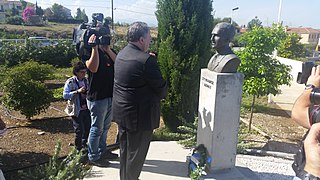 3
Stylianos Lenas was a member of EOKA, and one of the Cypriots who were wounded in battle against British soldiers.
3
Stylianos Lenas was a member of EOKA, and one of the Cypriots who were wounded in battle against British soldiers.
John F. Kennedy
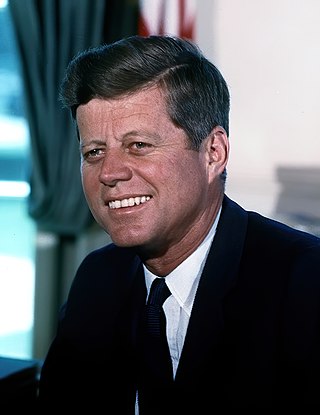 3
John Fitzgerald Kennedy, often referred to as JFK, was an American politician who served as the 35th president of the United States from 1961 until his assassination in 1963. He was the youngest...
3
John Fitzgerald Kennedy, often referred to as JFK, was an American politician who served as the 35th president of the United States from 1961 until his assassination in 1963. He was the youngest...
Saint Pantaleon
 3
Saint Pantaleon, counted in Western Christianity as among the Fourteen Holy Helpers of the Late Middle Ages, and in Eastern Christianity as one of the Holy Unmercenary Healers, was a martyr of...
3
Saint Pantaleon, counted in Western Christianity as among the Fourteen Holy Helpers of the Late Middle Ages, and in Eastern Christianity as one of the Holy Unmercenary Healers, was a martyr of...
Plato
 3
Plato, born Aristocles, was an ancient Greek philosopher of the Classical period who is considered a foundational thinker in Western philosophy and an innovator of the written dialogue and dialectic...
3
Plato, born Aristocles, was an ancient Greek philosopher of the Classical period who is considered a foundational thinker in Western philosophy and an innovator of the written dialogue and dialectic...
Christodoulos Sozos
 3
Christodoulos Sozos was a Greek Cypriot politician and lawyer. He served as a member of the Cypriot Legislative Council (1901–1911), mayor of Limassol (1908–1912) and Limassol–Paphos MP (1908–1912)....
3
Christodoulos Sozos was a Greek Cypriot politician and lawyer. He served as a member of the Cypriot Legislative Council (1901–1911), mayor of Limassol (1908–1912) and Limassol–Paphos MP (1908–1912)....
Constantine XI Palaiologos
 3
Constantine XI Dragases Palaiologos or Dragaš Palaeologus was the last Roman (Byzantine) emperor, reigning from 1449 until his death in battle at the Fall of Constantinople in 1453. Constantine's...
3
Constantine XI Dragases Palaiologos or Dragaš Palaeologus was the last Roman (Byzantine) emperor, reigning from 1449 until his death in battle at the Fall of Constantinople in 1453. Constantine's...
Umm Haram
 2
Umm Haram bint Milhan, known as Hala Sultan in Turkish tradition, was a companion and the maternal aunt of the Islamic prophet Muhammad. She was also one of the Ansar women of Medina.
2
Umm Haram bint Milhan, known as Hala Sultan in Turkish tradition, was a companion and the maternal aunt of the Islamic prophet Muhammad. She was also one of the Ansar women of Medina.
Agamemnon
 2
In Greek mythology, Agamemnon was a king of Mycenae who commanded the Achaeans during the Trojan War. He was the son of King Atreus and Queen Aerope, the brother of Menelaus, the husband of...
2
In Greek mythology, Agamemnon was a king of Mycenae who commanded the Achaeans during the Trojan War. He was the son of King Atreus and Queen Aerope, the brother of Menelaus, the husband of...
Digenes Akritas
 2
Digenes Akritas is a medieval Greek romantic epic that emerged in the 12th century Byzantine Empire. It is the lengthiest and most famous of the acritic songs; Byzantine folk poems celebrating the...
2
Digenes Akritas is a medieval Greek romantic epic that emerged in the 12th century Byzantine Empire. It is the lengthiest and most famous of the acritic songs; Byzantine folk poems celebrating the...
Melina Mercouri
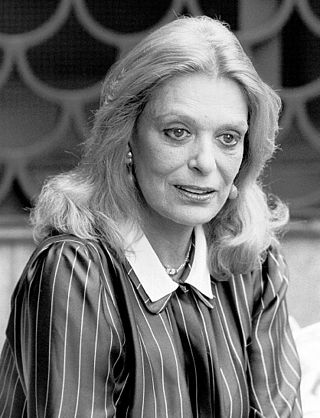 2
Maria Amalia "Melina" Mercouri was a Greek actress, singer, activist, and politician. She came from a political family that was prominent over multiple generations. She received an Academy Award...
2
Maria Amalia "Melina" Mercouri was a Greek actress, singer, activist, and politician. She came from a political family that was prominent over multiple generations. She received an Academy Award...
İsmet İnönü
 2
Mustafa İsmet İnönü was a Turkish army officer and statesman who served as the second president of Turkey from November 11, 1938, to May 22 1950, and as its prime minister three times: from 1923 to...
2
Mustafa İsmet İnönü was a Turkish army officer and statesman who served as the second president of Turkey from November 11, 1938, to May 22 1950, and as its prime minister three times: from 1923 to...
Amalia of Oldenburg
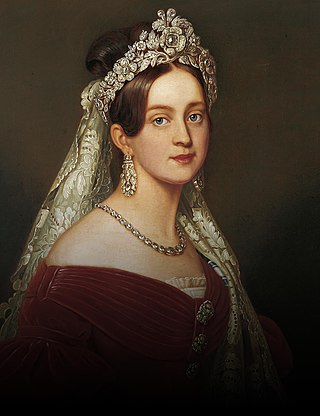 2
Amalia of Oldenburg was a Oldenburg princess who became Queen of Greece from 1836 to 1862 as the wife of King Otto Friedrich Ludwig. She was loved widely by the Greeks due to her patriotic love for...
2
Amalia of Oldenburg was a Oldenburg princess who became Queen of Greece from 1836 to 1862 as the wife of King Otto Friedrich Ludwig. She was loved widely by the Greeks due to her patriotic love for...
Mehmet Akif
 2
Mehmet Akif is a Turkish masculine given name. Notable people with the name include:Mehmet Akif Ersoy (1873–1936), Turkish poet
Mehmet Akif Pirim, Turkish sport wrestler
2
Mehmet Akif is a Turkish masculine given name. Notable people with the name include:Mehmet Akif Ersoy (1873–1936), Turkish poet
Mehmet Akif Pirim, Turkish sport wrestler
Anastasios George Leventis
 2
Anastasios George Leventis was a Greek Cypriot businessman who founded a major merchandise trading firm, A.G. Leventis (Nigeria) Plc, in West Africa. A dominant figure in the economy of many West...
2
Anastasios George Leventis was a Greek Cypriot businessman who founded a major merchandise trading firm, A.G. Leventis (Nigeria) Plc, in West Africa. A dominant figure in the economy of many West...
Aphrodite
 2
Aphrodite is an ancient Greek goddess associated with love, lust, beauty, pleasure, passion, procreation, and as her syncretized Roman goddess counterpart Venus, desire, sex, fertility, prosperity,...
2
Aphrodite is an ancient Greek goddess associated with love, lust, beauty, pleasure, passion, procreation, and as her syncretized Roman goddess counterpart Venus, desire, sex, fertility, prosperity,...
Aeschylus
 2
Aeschylus was an ancient Greek tragedian often described as the father of tragedy. Academic knowledge of the genre begins with his work, and understanding of earlier Greek tragedy is largely based on...
2
Aeschylus was an ancient Greek tragedian often described as the father of tragedy. Academic knowledge of the genre begins with his work, and understanding of earlier Greek tragedy is largely based on...
Athanasios Diakos
 2
Athanasios Nikolaos Massavetas
or Grammatikos also known as Athanasios Diakos was a Greek military commander during the Greek War of Independence, considered a venerable national hero in Greece.
2
Athanasios Nikolaos Massavetas
or Grammatikos also known as Athanasios Diakos was a Greek military commander during the Greek War of Independence, considered a venerable national hero in Greece.
Theodoros Kolokotronis
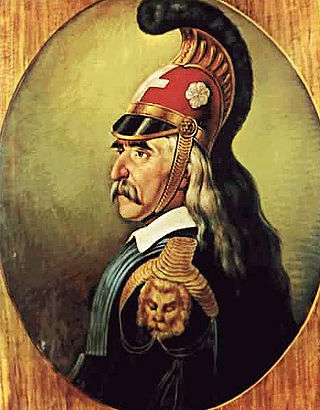 2
Theodoros Kolokotronis was a Greek general and the pre-eminent leader of the Greek War of Independence (1821–1829) against the Ottoman Empire.
2
Theodoros Kolokotronis was a Greek general and the pre-eminent leader of the Greek War of Independence (1821–1829) against the Ottoman Empire.
Dionysios Solomos
 2
Dionysios Solomos was a Greek poet from Zakynthos, who is considered to be Greece's national poet. He is best known for writing the Hymn to Liberty, which was set to music by Nikolaos Mantzaros and...
2
Dionysios Solomos was a Greek poet from Zakynthos, who is considered to be Greece's national poet. He is best known for writing the Hymn to Liberty, which was set to music by Nikolaos Mantzaros and...
Andreas Kalvos
 2
Andreas Kalvos was a Greek poet of the Romantic school. He published five volumes of poetry and drama - Canzone... (1811), Le Danaidi (1818), Elpis patridos (1818), Lyra (1824) and New odes (1826)....
2
Andreas Kalvos was a Greek poet of the Romantic school. He published five volumes of poetry and drama - Canzone... (1811), Le Danaidi (1818), Elpis patridos (1818), Lyra (1824) and New odes (1826)....
Aristophanes
 2
Aristophanes was an Ancient Greek comic playwright from Athens and a poet of Old Attic Comedy. He wrote in total forty plays, of which eleven survive virtually complete today. These provide the most...
2
Aristophanes was an Ancient Greek comic playwright from Athens and a poet of Old Attic Comedy. He wrote in total forty plays, of which eleven survive virtually complete today. These provide the most...
Nikos Kazantzakis
 2
Nikos Kazantzakis was a Greek writer, journalist, politician, poet and philosopher. Widely considered a giant of modern Greek literature, he was nominated for the Nobel Prize in Literature in nine...
2
Nikos Kazantzakis was a Greek writer, journalist, politician, poet and philosopher. Widely considered a giant of modern Greek literature, he was nominated for the Nobel Prize in Literature in nine...